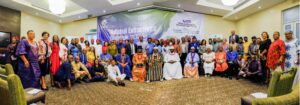Spaces for Change | S4C, in collaboration with Nigeria Extractive Industry Transparency Initiative (NEITI), hosted the second edition of the National Extractives Dialogue (NED2023) on September 14-15, in Owerri, Imo State, South-East, Nigeria. NED2023 brought together 176 participants comprising representatives from NEITI, Ghana Extractives Industry Transparency Initiative (GHEITI), National Human Rights Commission, Nigerian Upstream Petroleum Regulatory Commission (NUPRC), Nigerian Midstream and Downstream Petroleum Regulatory Authority (NMDPRA), federal legislative committees on host communities and local content, state ministries and agencies responsible for energy, petroleum and natural resources as well as large delegations of host communities of oil and gas companies across Nigeria.
Over the two days, presentations, panel discussions, and townhall sessions centering on the theme, ‘Host Community Development Trusts: Catalyst for Equitable Benefit Sharing for All‘ shed light on several aspects of petroleum operations in Nigeria and provoked conversations around the effectiveness of statutory mechanisms for the delivery of natural resource benefits to the petroleum-producing areas. As aptly noted by Mr. Uviovo, the Regional Coordinator of the Nigerian Upstream Petroleum Regulatory Commission (NUPRC), the Host Community Development Trusts (HCDTs) represent a pivotal stride toward addressing host communities’ multifaceted concerns and needs. Chapter 3 of the Petroleum Industry Act (PIA) mandates settlors, i.e. oil corporations, to establish and maintain these Trusts. This legislative beacon signifies that the benefits of natural resources must now be channeled back to the communities from whence they originated, with extractive corporations, whether indigenous or international, required to contribute 3% of their actual operating expenditure to the Trusts.
Like its inaugural edition, NED2023 provided a no-holds-barred platform for constructive dialogue among host communities, regulatory bodies, federal and state policymakers, civil society, and oil and gas corporations, allowing the key strengths and gaps in the implementation of the HCDTs to emerge. For instance, several oil and gas companies have taken steps to constitute the HCDTs within the timelines stipulated by the PIA. More specifically, joint venture partners—which include the Nigerian National Petroleum Company Limited (NNPC), Shell Petroleum Development Company (SPDC), TotalEnergies, and the Nigerian Agip Oil Company—have introduced 16 out of the 22 incorporated Host Community Development Trusts in Imo, Rivers, Delta, and Bayelsa states. These localized governance structures have been created to institutionalize community participation in petroleum resource management as required by law.
On the other hand, the discussions revealed that state governments play minimal roles in the administration of the Trusts, making effective oversight of companies’ compliance with the regulatory requirements to meaningfully engage communities quite difficult. State governments advocated for an increased role in the implementation of the HCDTs as well as other aspects of natural resource governance. Due to the close proximity between states and communities, the PIA ought to have envisaged and vested significant oversight responsibilities on ministries and agencies at the subnational levels. Communities also raised concerns about certain practices by corporations causing tensions within the petroleum-producing areas such either the imposition of candidates or opaque procedures for the selection of local representatives on the governance structures, gender inequality, marginalization of minority communities, inequitable sharing formula for allocating resources to the resource-bearing, access and impacted communities, and so forth.
State and federal authorities such as the NUPRC, NMDPRA, NEITI, and state ministries of environment, petroleum resources, and energy, welcomed the deluge of feedback from both the representatives of host communities, as well as the Board of Trustees (BOTs) and Management Committees of the various HCDTs set up across the Niger Delta region by extractive corporations. Dr Orji Ogbonnaya Orji, NEITI’s Executive Secretary, urged host communities to assert full ownership of the HCDTs to prevent any potential mismanagement that could jeopardize the equitable distribution of benefits. Complete ownership of the HCDTs entails community-led initiatives, including the identification of priority projects, the selection of reputable individuals for the BOTs, the formulation of an equitable fund allocation strategy, and the establishment of a sustainable plan for the HCDTF.
This year’s dialogue witnessed a significantly higher participation of women in the extractive sector than the previous year. Among the attendees were female traditional rulers, women leaders, and grassroots mobilizers appointed to the Boards of Trustees of various HCDTs. They unanimously demanded better representation of women not only on the resource governance structures but also at the contract negotiation tables. A detailed presentation on S4C’s Community-Investor Guidelines, sensitized community representatives serving on the BOTs on the modalities for engaging meaningfully with extractive corporations and for negotiating better deals for their communities and unborn generations.
While collectively acknowledging that no law is perfect, including the PIA, discussions over the two days showed that indeed, huge gaps exist between policy and practice. Participants, however, praised S4C for constantly providing opportunities for local communities to articulate their concerns, interface directly with regulators and policymakers, and gain relevant knowledge of the best practices undergirding equitable benefit-sharing. Capacity-building and legal empowerment initiatives by Spaces for Change have helped to bridge knowledge deficits, dismantle power asymmetry, and expose discrepancies in policy implementation, enabling key actors to understand areas where urgent action is required. Through NED, S4C will continue to facilitate the exchange of knowledge among stakeholders in the extractives industry while deepening the active involvement of resource-rich communities in shaping and implementing development projects that align with their specific needs and aspirations.





















